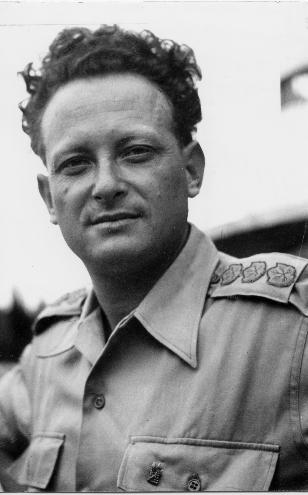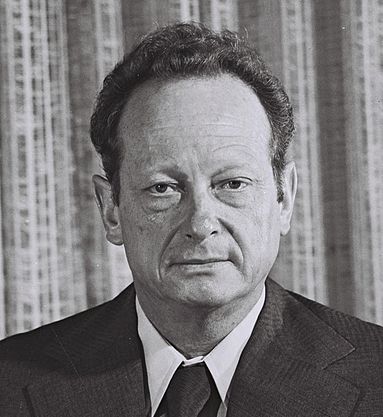<Back to Index>
- Botanist Erik Acharius, 1757
- Painter Jean Antoine Watteau, 1684
- Minister of Foreign Affairs Yigal Allon, 1918
PAGE SPONSOR


Yigal Allon (Hebrew: יגאל אלון, 10 October 1918 – 29 February 1980) was an Israeli politician, a commander of the Palmach, and a general in the IDF. He served as one of the leaders of Ahdut HaAvoda party and the Israeli Labor party, acting Prime Minister of Israel, as well as being a member of Knesset and government minister from the tenth through the seventeenth Knessets.
Allon was born in Kfar Tavor in the British Mandate of Palestine. In 1937 he graduated from Kadoorie Agricultural High School, and joined kibbutz Ginosar. His military activities began when he served as commander of a field unit of the Haganah, and then as a commander of a mobile patrol in northern Palestine during the Arab riots of 1936 - 39. During this period he participated in several operations of the Special Night Squads (SNS), under the command of Orde Charles Wingate and H.E.N. Bredin. In 1941 he became one of the founding members of the Palmach. That same year he took part in the British invasion of Lebanon and Syria. In 1943 he became the Deputy Commander of the organization, and served in this post until 1945, when he became Commander in Chief.
As a Palmach commander, Yigal Allon approved the 18 December 1947 operation against al Khisas, near the Lebanese border. Several houses were blown up and a dozen civilians were killed.
On 11 June 1948, at the climax of Ben Gurion's confrontation with the Irgun over the distribution of weapons from the Altalena, Allon commanded the troops ordered to shell the vessel.
During the 1948 Arab - Israeli War, Allon led several of the major operations of the war, on all three fronts, including Yiftach in the Galilee, Danny in the Centre, Yoav, and Horev in the Negev. Operation Danny was the first one in which several brigades (Yiftach, Harel, the 8th Armored Brigade and two battalions from the Kiryati and Alexandroni) were involved, and was carried out under Palmach command. It was conducted between the first and second ceasefires of the war, on July 9 – 19, 1948. The objectives were to capture territory east of Tel Aviv and then to push inland and relieve the Jewish population and forces in Jerusalem. The first phase of the operation succeeded, capturing the two towns of Lydda and Ramle and putting the international airport at Lydda and the strategic railway station in Israeli hands. Following the capture of the two towns there was an exodus of their Arab population and only a few hundred of the 50,000 to 70,000 residents remained. The second phase of the operation failed after several costly attempts on Arab Legion positions at Latrun and the threat of a UN imposed cease fire. His last major military roles as commander were in October 1948: Operation Operation Yoav towards the Hebron Hills and Operation Horev along the Southern Egyptian Front.
As Operational Commander of the Southern Command he was responsible for security along the borders with Egypt and parts of Jordan. On 4 June 1949 he ordered that an eight kilometre wide zone along the border would be military area in which "all strangers found in [them] will be shot without interrogation."
On 25 October 1949, whilst he was out of the country, he was replaced as OC Southern Command by Moshe Dayan. Most of his Staff Officers resigned in protest. He retired from active service in 1950.
Allon was fluent in Arabic and made efforts to go into Arab villages and make peace. He was believed to be a close friend of the elder King Hussein of Jordan.
After ending his military career, Allon embarked on a political career. He became a prominent leader in Ahdut HaAvoda, and was first elected to the Knesset in 1955,
where he served until his death. He was a member of the Economic
Affairs Committee, Constitution, Law and Justice Committee, Education
and Culture Committee, Joint Committee on the Motion for the Agenda
Regarding Sports in Israel, and the Foreign Affairs and Defense Committee. He served as the Minister of Labour from
1961 - 67. In this role he worked to improve the state employment
service, extend the road network, and fought to get legislation on
labor relations passed. From 1967 - 69 he served as the Deputy Prime Minister and Minister of Immigrant Absorption. In 1967 he was a part of the group that planned the Six - Day War. Allon served briefly as interim Prime Minister following the death of Levi Eshkol on 26 February 1969. He held office until 17 March 1969, when Golda Meir took over after being appointed leader of the Labor Party. He became the Deputy Prime Minister and Minister of Education and Culture in Meir's government, and served in that post until 1974. In 1974 he was a part of the delegation to the Separation of Forces Agreement. He became the Minister of Foreign Affairs in 1974, and held this post until 1977. At the time of his sudden death in 1980, he was a candidate for the leadership of the Alignment, challenging the incumbent party head Shimon Peres. Allon was the architect of the Allon Plan, a proposal to end the Israeli occupation of the West Bank with
a negotiated partition of territories. A major road in the West Bank,
leading north-eastwards from Jerusalem, is named after him.